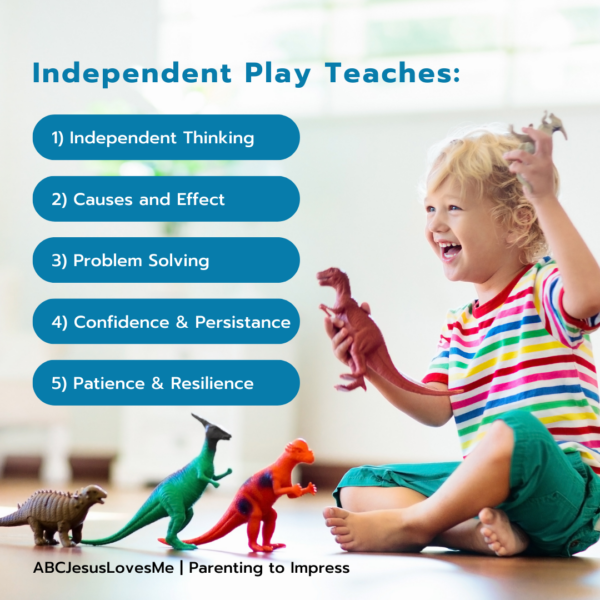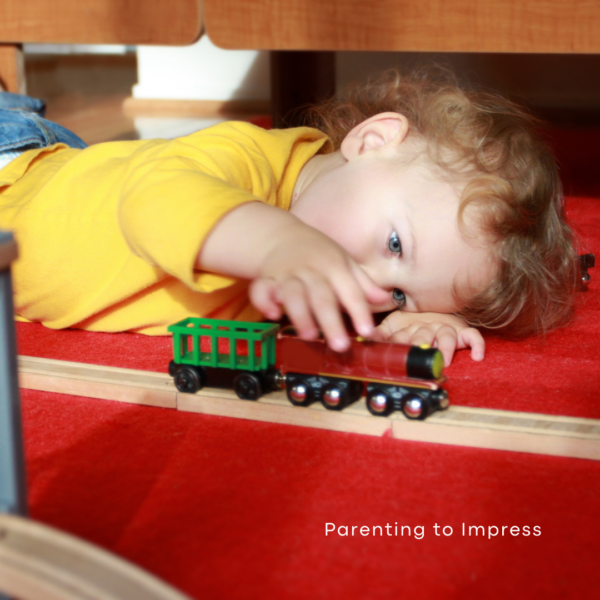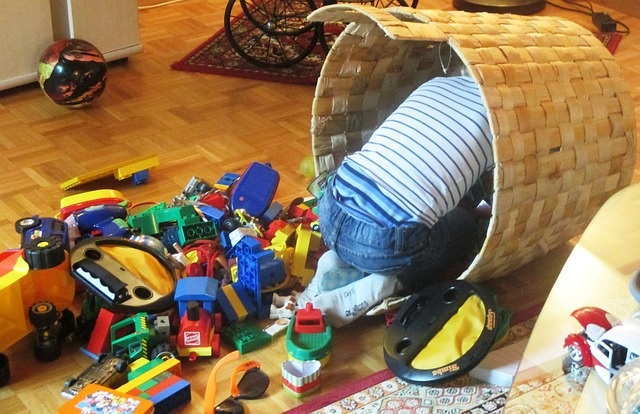Resharing from 2013 an update to one of the most popular posts on Parenting to Impress.
Among moms, there’s a prevalent belief that the more time you spend playing with your kids, the better mom you are. Don’t believe me? Just check social media. There you’ll find picts of moms doing fun activities with their kiddos, followed by a flood of comments like, “You are a great mom!” and “Your kids are so blessed to be in such a fun family.”
But what if I shared on social media that my kids just told me, “Mommy, we don’t want to play with you. We want to just play together.”? Crickets.

INDEPENDENT PLAY Is IMPORTANT
In today’s culture, many believe that children need constant engagement to stay out of trouble and broaden their experiences. However, I believe too much interaction can result in a needy and demanding child, which in turn hampers their ability to entertain themselves and stifles their creativity and imagination.
Beyond instilling a solid foundation of the Bible and introducing giving my child the gift of work, I consider nurturing a toddler or preschooler’s world of play and imagination to be one of the most crucial aspects of parenting.
During independent play, children learn:
- To think for themselves
- Cause and effect
- Problem-solving skills
- Confidence to persist through challenges
- Patience and resilience
- A strong self-images, as the child doesn’t rely on others to guide their thinking

HOW TO TEACH YOUR CHILD TO PLAY INDEPENDENTLY
To help a child who has never played alone, it’s best to start small and gradually increase independence as the child develops the necessary imagination and confidence.
Consider this scenario: Jack (3) has never played by himself. Typically, he either watches TV, plays on the iPad, or is entertained by an adult. Now, after learning the importance of independent play, Mom and Dad are eager to help Jack learn this age-appropriate concept.
Day 1: Mom instructs Jack to choose a toy set, and he selects trains. Before bringing out the trains, Mom explains to Jack that she is going to make supper, but because he is a big boy, he gets to play alone. She helps him set up a small track to which he will play independently for five minutes. They use a timer, started by Jack, to determine the duration. When the timer beeps, Mom returns to see what Jack has created. Jack is instructed not to call for Mom or leave his play area, and he’s allowed to only play with the train during this time. Consistency in expectations is key. If Jack doesn’t adhere to the rules for independent playtime, it becomes a disciplinary situation, and consequences must follow.
Ideally set up the toy so that you can observe Jack playing while you cook, but Jack can’t easily see you. Feel free to peak but avoid interacting with the child. As soon as the timer goes off, return to Jack asking him to show you what he did while you were away. Praise him for being patient (a Fruit of the Spirit) and creative while making dinner. Continue incorporating independent play with use of the timer.
Day 2: Continue practicing with the timer. If the child can’t successfully play for 5 minutes per the terms, reduce the timer to help the child be successful. If the child is ready to extend the time, increase it in intervals of 2-5 minutes.
Day 3: Instead of the parent initiating the playtime with the child, only assist in retrieving the toy (if needed) and assisting with the timer. With consistent practice and clear expectations, Jack will be able to play independently with a designated toy for longer periods of time.

Independent Play Tips
1. Especially during the training period, keep younger siblings away from the child. If a toddler gets into their toys, it will likely lead to the child seeking interaction with you.
2. Choose toys or groups of toys that can hold the child’s interest for several minutes. A single car may not capture their attention as effectively as several cars and a floor mat. Our children happily play for hours with toys like Legos, straw constructors, and magnetic tiles. Rotating toys for independent play time gives the child a “new” toy to explore. But it’s important to remember that too many toys can overwhelm a child, so in this case, more isn’t necessarily better.
3. If the child becomes frustrated while playing, avoid immediately fixing the problem. It’s through figuring out a solution that learning and confidence develops.
4. Children learn the basics of play by imitating. As babies, demonstrate stacking blocks and knocking them over, or rolling a ball. Help toddlers put together puzzles by providing two pieces that fit together. For preschoolers, questions to stimulate their thinking about different train track designs. And for my elementary-aged daughter, she observes me being both Mommy and teacher, which she translates into her play with dolls.
5. It is important to return as soon as the time goes off and consistently avoid allowing the child to interact with you while the timer is counting down. This teaches the child to respect your time, and in turn, shows him that you respect his time by promptly returning. Teaching him to play with one toy or set of toys at a time for an extended amount of time encourages the growth of his imagination.
6. As the social guilt sets in, remember that it is important to maintain a clean home, prepare nutritious meals, be a godly wife, and have “me” time for self-care and rejuvenation. Continually entertaining your child hinders your ability to provide all aspects of the strong foundation they need. Play is only one of those aspects.
It Was Huge Compliment
Remember my story about my children telling me they didn’t want me to play with them? My initial impulse was to insist they come for learning, craft, and game time with Mommy, and lecture them about how some kids have to beg their mommy to play with them.
But I didn’t.
Instead, I let go of my pride and realized I had just received a huge compliment from my kids. Their request meant that they didn’t need constant entertainment. It also meant that they enjoyed playing together. So, I let them play while I tended to adult chores. After a while, they came to me ready for Mommy-time, and I was happy to oblige.
Join us next week for a helpful tips on teaching your child Stick-to-itiveness!
Also Read:
- Is Keeping Your Child Busy the Answer?
- It’s Your Kid, Not a Gerbil by Dr. Kevin Leman
- Characteristics of a God-Centered Family
- Why I Hate the Word Bored

Unsure how to train your child to obey using grace and truth? I invite you to join us:
- August 2-3, 2024 – NW Arkansas
We will dive into the Bible to determine God’s plan for raising children. Also learn how to parent and teach intentionally, get the most out of the ABCJesusLovesMe Curricula, and create a play-based learning environment. Discover what to teach and how to teach! Perfect for preschool or Sunday School teachers, moms and dads, MOPS leaders, grandparents, and daycare leaders. Learn more…

This article truly emphasizes the importance of fostering independent play in children. Encouraging self-directed activities not only nurtures creativity but also builds essential life skills. Kudos to the author for highlighting such a crucial aspect of parenting!
So true! Thank you for sharing. –heidi
thank you so much for sharing this with me. I’m truly blessed 🙏🙏🙏
I’m so glad this info was helpful! Please let me know if you have any questions. –heidi